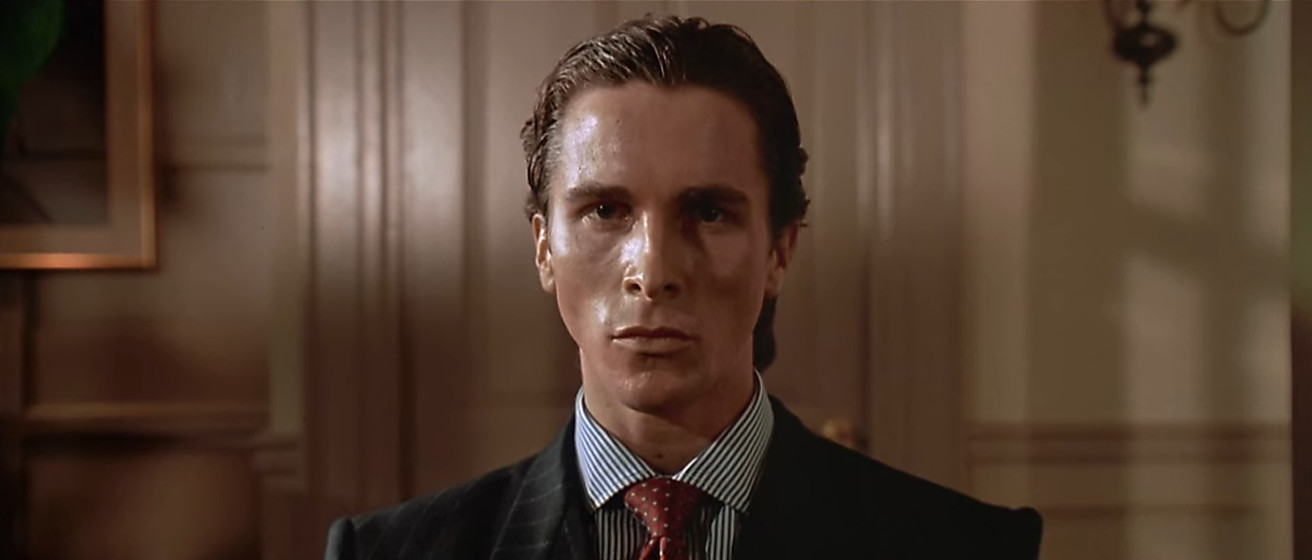American Psycho (2000)
Like it or not, it’s become iconic and somewhat of a cult classic. I won’t be rehashing reviews that either demonize it or over-interpret it. I just have a few observations.

Objective reality?
Both the book and the film are famous for hinting at the fact that the narrator is unreliable. Ellis, the author of the book, was initially concerned that the movie version won’t be able to convey this ambiguity well, but I think it did brilliantly. The characters in the story mistake each other for somebody else, or can’t remember when a particular event happened, and don’t seem to be able to hold conversations.
This feature is even more pronounced by some Easter eggs in the movie compared to the book: Paul Owen is now Paul Allen (not this one), Timothy Price is now Timothy Bryce, Evelyn Richards is Evelyn Williams, Courtney Lawrence is Courtney Lawrinson, and so on.
David Bowie’s soundtrack entry (from his underrated “hours…"/"Omikron” era) is also a version with mixed up lyrics 1 compared to the original. Better yet, the “American Psycho Remix” available on the extended version of the album does not have the mangled up lyrics. Mandela effect-inducing!
All this isn’t to say that it’s certain that it’s all in his head. Maybe none of it was, maybe some of it was, there is enough ambiguity not to be able to tell.
Mr Nice Guy
Christian Bale shared that while watching Tom Cruise being interviewed by David Letterman he saw “intense friendliness with nothing behind the eyes” and used that in his depiction of Patrick Bateman. There is definitely Cruise-style over-enthusiastic emptiness channelled there!
The author of the book initially imagined the protagonist as non-violent, and he interestingly revealed 20 years after the release that:
[Patrick Bateman] did not come out of me sitting down and wanting to write a grand sweeping indictment of yuppie culture. It initiated because of my own isolation and alienation at a point in my life. I was living like Patrick Bateman. I was slipping into a consumerist kind of void that […] just made me feel worse and worse and worse about myself. […] It wasn’t that I was going to make up this serial killer on Wall Street. […] It came from a much more personal place.
This makes for a much more interesting interpretation avenue. You can’t really “see yourself” in the Patrick Bateman cutting escaping prostitutes with a chainsaw. (At least I hope you can’t!) But I sure can see patterns of behavior like the business card scene that I wish was less relatable than it is. Or enjoying your apartment less because somebody else’s is in a nicer location ;-) Consumerism, yup.
Similarly, Bateman’s self-described internal indifference and apathy is something more relatable than his love for axes and nail guns. For one thing, similar attitude was widely communicated by 1990s’ grunge and industrial music. Kurt Cobain sang "I don’t care if it’s old, I don’t mind, don’t have a mind". Trent Reznor sang "There is no love here and there is no pain, Every day is exactly the same" or "I am just a copy of a copy of a copy". Eddie Vedder sang "I won’t change direction, and I won’t change my mind. How much difference does it make?" So when Bateman says "there is no real me […]: I simply am not there", it does sound like he’s expressing that same depressive line of thought. That goes more into “Fight Club” territory.
A thought on transgressive fiction
The film, to a lesser extent than the book, is controversial due to its explicit images of violence, in particular against women. Moreover, since that violence is never punished, the work of art seems to be morally ambivalent.
I’m personally a little surprised by the level of backlash, as “slasher films” were already an entire genre at time of release of the book in 1991. Computer games predating the movie could depict similar levels of violence and gore. And those more often than not were/are played by minors.
I never got the impression the authors endorse Bateman’s behavior, be it real or imagined. In his final confession Bateman says his pain is “constant and sharp”, that “there is no catharsis”, and ultimately he “gains no deeper knowledge of myself”. Even his non-homicidal behavior didn’t exactly make him a likable character. His narcissism, fear of exclusion ("I just want to fit in"), and shallow relationships come off as rather pathetic, not envy-inducing.
I don’t think the gruesome content is automatically harmful, especially in the movie’s black comedy context. The “It’s Hip To Be Square” scene is obviously satirical, and Bateman’s monologues about ‘80s music add more flavor to the “I’m not there” interpretation I talked about before. For instance, he mentions that Phil Collins’ solo career is "more satisfying, in a narrower way" giving two examples: Against All Odds and In The Air Tonight.
Hilariously, the former’s famous chorus goes "take a look at me now, well there’s just an empty space" and In The Air Tonight contains the line "I was there and I saw what you did, I saw it with my own two eyes". This is clearly intentional, well written.
Ultimately, I guess what I’m saying is: I should be able to say I enjoyed the film without it necessarily meaning I support the protagonist’s crimes.
-
Abracadoo - I lose you, we can’t avoid the clash
The big mistake, now we’re gonna pay and pay
I guess you know I never wanted anyone more than you
Lived all our best times, well, I know you hold your head up high
There’s nothing we have to say, there’s nothing in my eyes
But there’s something in the air
There’s something I have to say
There’s something in the air